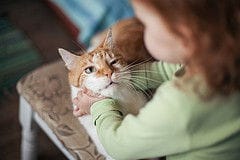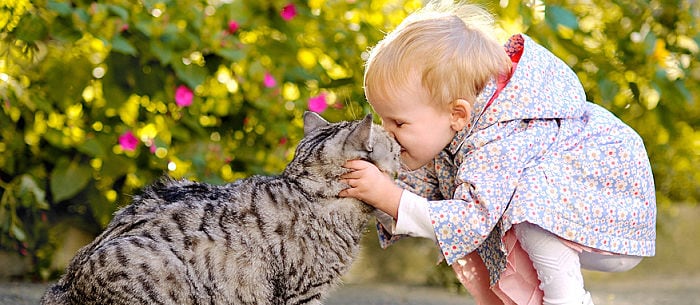You’ve got your hands full with your kids, so you might laugh at the thought of adding a pet into the mix. But if you can see your way past the vet visits and stinky litter box odor, adding a domestic cat to your household just might be one of the best decisions you make as a family.
A new kitty can quickly become your child’s devoted friend. “Contrary to popular belief, cats really like human companionship,” says Anthea Appel, an animal naturopath in New York City. In fact, some cats are very social, to the point where they love to follow their owners around the house and watch them work.
A cat can also teach your child a lot of important life lessons. For instance, “a cat can help your child practice good social skills,” says Dr. Jane Brunt, a feline specialist and member of the American Veterinary Medical Association. Your child will quickly learn that she’ll need to approach the pet slowly and speak to it in a calm voice, says Dr. Brunt.

Here are 15 ways that having a domestic cat can benefit your child!
- Lower Stress Levels
“The vibration of a cat’s purrs are therapeutic, lowering [stress] and helping to heal infection,” points out Appel.
- Companionship
Your child will love having a special friend in the house, especially if he is an only child or has siblings that are quite a bit older. A cat will help your little one fight back feelings of loneliness while engaging in some feline fun.
- A Lesson on Empathy
It’s important for your child to learn how to tune into another being’s feelings and needs, and a pet cat can be the perfect teacher. Your little one can learn how to respect and care for others by gently petting your cat, stroking his ears and listening to his purrs.
- An Understanding of Cat Biology
“Taking care of animals teaches kids about life forms that are different from us,” notes Appel. Your child can learn why cats tails are so important (for balance), or that not every animal uses water to get clean.
- Reduced Risk of Developing Allergies
According to the American Humane Association, studies have found that introducing a cat into your home before your child arrives may actually reduce his risk of developing allergies in the future.
- Reduced Risk of Developing Asthma
Children who are exposed to cats early in life may have a reduced risk of developing asthma, according to the American Academy of Allergy, Asthma & Immunology.
- Entertainment
There’s a reason so many silly cat videos go viral: Felines are too cute! Your little one will love to watch her pet roll around, climb up curtains and hide in boxes.
- Responsibility
Taking care of a pet is a big job. By sharing some of the responsibility with your child, you can teach him the importance of being organized and staying on schedule. Your little one can take pride in helping you with daily tasks, like feeding your cat, scooping out his litter box and brushing his coat.
- A Source of Joy During Difficult Times
Owning a cat won’t remove the sting of a skinned knee, but cuddling with a kitty can certainly take your child’s mind off of a boo-boo or something that’s bothering him.
- An Understanding of the Circle of Life
As hard as it is to face, all pets die eventually. Though losing a beloved cat is tough for kids, this experience is beneficial in that it teaches them about life’s brevity and preciousness.
- Exercise
A domestic cat can encourage your child to engage in active play throughout the day. Your little one will just love to race your kitty down the hall!
- New Friends
Who isn’t drawn to an adorable kitten? All the kids on the block will come running to play with your child when they see how cute his cat is.
- Patience
As cats tend to be quite solitary in nature, your child will need to learn how to sit tight and relax until his furry friend is ready to play.
- A Lesson on Sharing
A little for you, a little for me! As your child develops a relationship with her pet, she will feel the urge to do what she can to ensure that her furry friend is happy and comfortable. Don’t be surprised if you see your little one offering your cat a few drops of cereal milk or a comfy spot on the couch.
- Love
Simply put, a cat can teach your child how to love and be loved. These pets will shower your little one with affection!
And read 6 Ways Cats Make Your Life Better.
Jennifer Kelly Geddes is a New York-based writer and editor who specializes in parenting, health and child development. She’s a frequent contributor to Care.com and the mom of two teen girls.

